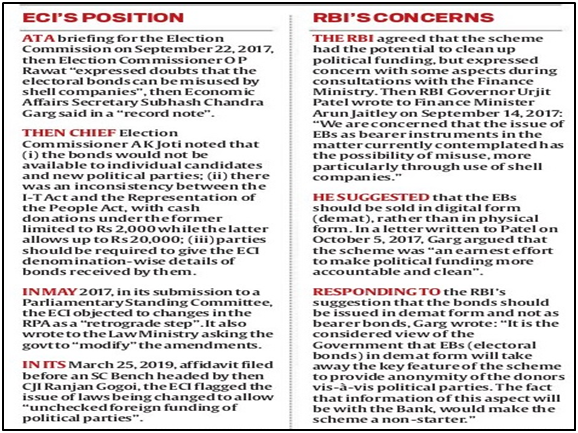Why in news?
- A five-judge bench of the Supreme Court led by CJI will start hearing petitions challenging the constitutional validity of the Centre’s electoral bonds scheme from October 31.
- In response to these petitions, the Centre's affidavit told the apex Court that citizens' right to know is subject to reasonable restrictions.
What’s in today’s article?
What are Electoral bonds (EBs)?
- About
- Electoral bonds are a financial instrument introduced by the Government of India in 2018 to facilitate anonymous political donations.
- An electoral bond is a bearer instrument, like a promissory note, that is payable to the bearer on demand to donate their contributions to political parties.
- Who are eligible to receive electoral bonds?
- Only registered political parties are eligible to receive electoral bonds.
- However, there are certain criteria that political parties must meet to be eligible to receive electoral bonds. These are:
- Recognition: The political party must be registered under Section 29A of the Representation of the People Act, 1951.
- Recent Election Performance: The party must have secured at least 1% of the votes polled in the most recent Lok Sabha or State Assembly election.
- Available denominations
- The Government of India has specified various denominations for electoral bonds, ranging from Rs. 1,000 to Rs. 1 crore.
- Authorized bank
- SBI is the only bank authorised to sell these bonds.
- Working
- A citizen of India or a body incorporated in India is eligible to purchase the bond.
- EBs are issued/purchased for any value, in multiples of Rs 1,000, Rs 10,000, Rs 1,00,000, Rs 10,00,000 and Rs 1,00,00,000 from the specified branches of the State Bank of India (SBI).
- EBs have a life of only 15 days during which it can be used for making donation only to the registered political parties.
- The bonds shall be available for purchase for a period of 10 days each in the months of January, April, July and October as may be specified by the Central Government.
- The bond can be encashed by an eligible political party only through a designated bank account with the authorised bank.
- The political parties have to disclose the amount to the Election Commission.
What is the Rationale behind the introduction of EB?
- Encouraging Digital Transactions:
- The electoral bond scheme was intended to promote a shift from cash-based political donations to digital transactions.
- By facilitating donations through banks, the government aimed to reduce the use of unaccounted or black money in political funding.
- Anonymity of Donors:
- It aimed to provide anonymity to donors. The donor's name is not mentioned on the bond.
- Donors who contribute less than Rs 20,000 to political parties through purchase of electoral bonds need not provide their identity details such as PAN, etc.
- It was argued that this would protect individuals or entities from potential backlash or reprisals due to their political affiliations.
- Formalizing Political Contributions:
- The introduction of electoral bonds aimed to formalize political contributions by channelling donations through the banking system.
- This move aimed to establish a documented trail of donations, making the process more transparent and accountable.
- Enhancing Transparency:
- While the donors' identities remain anonymous, the electoral bond scheme aimed to enhance transparency in political funding.
- It does so by mandating political parties to disclose the details of electoral bond donations in their financial statements.
Criticisms of Electoral Bond
- Lack of Transparency:
- While the scheme requires political parties to disclose the amount of donations received through electoral bonds, the identity of the donors remains anonymous.
- Potential for Money Laundering:
- Critics argue that the anonymity provided by electoral bonds can be misused for money laundering or routing black money into the political system.
- Unequal Advantage to Ruling Parties:
- The fact that such bonds are sold via a government-owned bank (SBI) leaves the door open for the government to know exactly who is funding its opponents.
- This, in turn, allows the possibility for the government of the day to either extort money, especially from the big companies, or victimise them for not funding the ruling party.
- Bypassing Election Commission Scrutiny:
- Unlike other forms of political funding, electoral bonds do not require ECI approval or verification, which can undermine the ECI's oversight role in regulating political funding and ensuring a level playing field.
- No upper limit on funding
- Before the electoral bonds scheme was announced, there was a cap on how much a company could donate to a political party: 7.5 per cent of the average net profits of a company in the preceding three years.
- However, the government amended the Companies Act 2013 to remove this limit, opening the doors to unlimited funding by corporate India.
- Concerns raised by RBI and EC
- RBI and the ECI have raised concerns about electoral bonds. They said that electoral bonds could:
- Increase black money circulation, money laundering, cross-border counterfeiting, and forgery;
- Set a bad precedent by encouraging money laundering and undermining faith in Indian banknotes;
- Erode a core principle of central banking legislation;
- Legitimize opacity in how elections are funded;
- Become vehicles for money laundering for shell companies and foreign donations.











